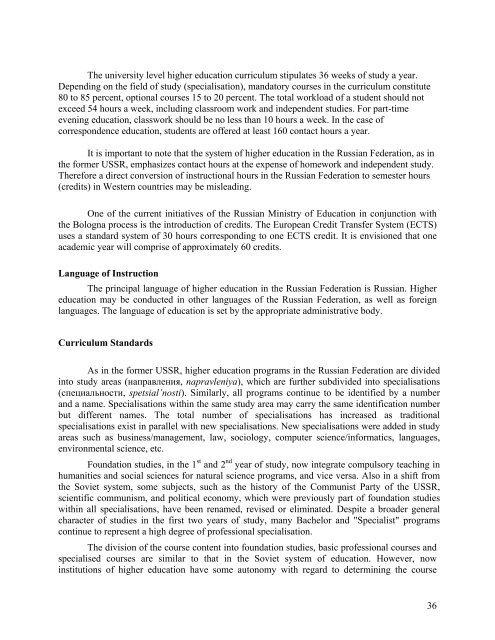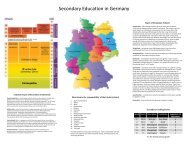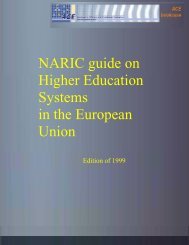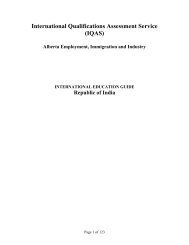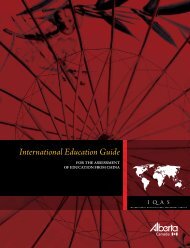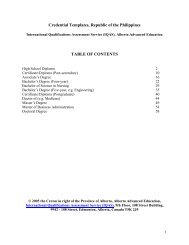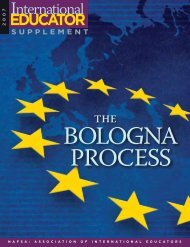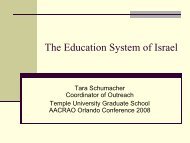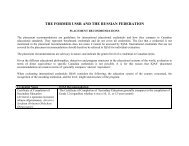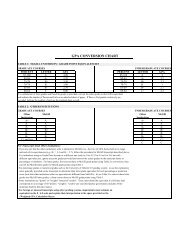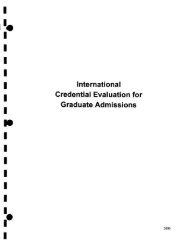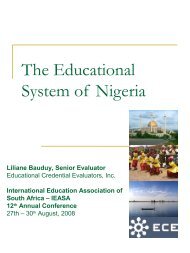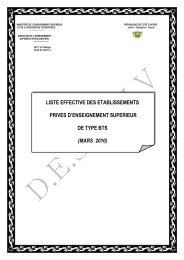Credential Templates, The Former USSR and the Russian Federation
Credential Templates, The Former USSR and the Russian Federation
Credential Templates, The Former USSR and the Russian Federation
You also want an ePaper? Increase the reach of your titles
YUMPU automatically turns print PDFs into web optimized ePapers that Google loves.
<strong>The</strong> university level higher education curriculum stipulates 36 weeks of study a year.<br />
Depending on <strong>the</strong> field of study (specialisation), m<strong>and</strong>atory courses in <strong>the</strong> curriculum constitute<br />
80 to 85 percent, optional courses 15 to 20 percent. <strong>The</strong> total workload of a student should not<br />
exceed 54 hours a week, including classroom work <strong>and</strong> independent studies. For part-time<br />
evening education, classwork should be no less than 10 hours a week. In <strong>the</strong> case of<br />
correspondence education, students are offered at least 160 contact hours a year.<br />
It is important to note that <strong>the</strong> system of higher education in <strong>the</strong> <strong>Russian</strong> <strong>Federation</strong>, as in<br />
<strong>the</strong> former <strong>USSR</strong>, emphasizes contact hours at <strong>the</strong> expense of homework <strong>and</strong> independent study.<br />
<strong>The</strong>refore a direct conversion of instructional hours in <strong>the</strong> <strong>Russian</strong> <strong>Federation</strong> to semester hours<br />
(credits) in Western countries may be misleading.<br />
One of <strong>the</strong> current initiatives of <strong>the</strong> <strong>Russian</strong> Ministry of Education in conjunction with<br />
<strong>the</strong> Bologna process is <strong>the</strong> introduction of credits. <strong>The</strong> European Credit Transfer System (ECTS)<br />
uses a st<strong>and</strong>ard system of 30 hours corresponding to one ECTS credit. It is envisioned that one<br />
academic year will comprise of approximately 60 credits.<br />
Language of Instruction<br />
<strong>The</strong> principal language of higher education in <strong>the</strong> <strong>Russian</strong> <strong>Federation</strong> is <strong>Russian</strong>. Higher<br />
education may be conducted in o<strong>the</strong>r languages of <strong>the</strong> <strong>Russian</strong> <strong>Federation</strong>, as well as foreign<br />
languages. <strong>The</strong> language of education is set by <strong>the</strong> appropriate administrative body.<br />
Curriculum St<strong>and</strong>ards<br />
As in <strong>the</strong> former <strong>USSR</strong>, higher education programs in <strong>the</strong> <strong>Russian</strong> <strong>Federation</strong> are divided<br />
into study areas (направления, napravleniya), which are fur<strong>the</strong>r subdivided into specialisations<br />
(специальности, spetsial’nosti). Similarly, all programs continue to be identified by a number<br />
<strong>and</strong> a name. Specialisations within <strong>the</strong> same study area may carry <strong>the</strong> same identification number<br />
but different names. <strong>The</strong> total number of specialisations has increased as traditional<br />
specialisations exist in parallel with new specialisations. New specialisations were added in study<br />
areas such as business/management, law, sociology, computer science/informatics, languages,<br />
environmental science, etc.<br />
Foundation studies, in <strong>the</strong> 1 st <strong>and</strong> 2 nd year of study, now integrate compulsory teaching in<br />
humanities <strong>and</strong> social sciences for natural science programs, <strong>and</strong> vice versa. Also in a shift from<br />
<strong>the</strong> Soviet system, some subjects, such as <strong>the</strong> history of <strong>the</strong> Communist Party of <strong>the</strong> <strong>USSR</strong>,<br />
scientific communism, <strong>and</strong> political economy, which were previously part of foundation studies<br />
within all specialisations, have been renamed, revised or eliminated. Despite a broader general<br />
character of studies in <strong>the</strong> first two years of study, many Bachelor <strong>and</strong> "Specialist" programs<br />
continue to represent a high degree of professional specialisation.<br />
<strong>The</strong> division of <strong>the</strong> course content into foundation studies, basic professional courses <strong>and</strong><br />
specialised courses are similar to that in <strong>the</strong> Soviet system of education. However, now<br />
institutions of higher education have some autonomy with regard to determining <strong>the</strong> course<br />
36


